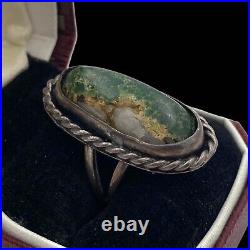
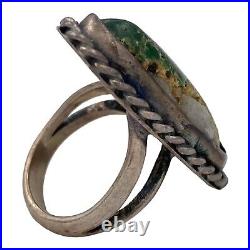
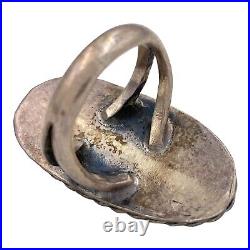
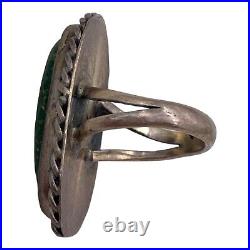
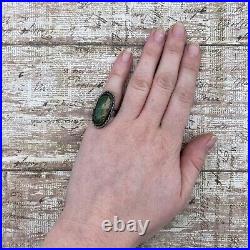

We have similar Turquoise and Native American items, which would pair nicely with this piece, for sale this week. Listing description by: Angela A. Markings : Unmarked, tested, and guaranteed. Length: 22.85 mm. Width : 9.05 mm. Color: opaque deep green hue with a pale green spiderwebbing, as well as a crystal-white and brown matrix. Accent stone measurements/color. Stone treatment : The stone(s) appear to be untreated, but we are not certified gemologists. Stone(s) have been tested and guaranteed using a professional Presidium Duo refractive, heat, and hardness tester. Stone cuts : Carved and polished oval cabochon. Handmade in the 1950s by a talented Diné (Navajo) silversmith. 900 sterling silver, also known as coin silver, a popular purity of silver during this time period. Beautiful, rare Carico Lake turquoise cabochon stone rests in a bezel setting. The stone displays a unique deep green hue with lighter green spiderwebbing. A rope twist motif surrounds the turquoise. Smooth, polished band for comfortable wear. Damage : Age appropriate wear. Tarnish on the silver gives the piece an antique quality we believe is rather lovely; tarnish can be removed with a buffing. The price has been reduced to reflect this. This listing is for the item only. This beautiful piece was made by a very talented Native American silversmith. It features handcrafted silversmith work throughout. Antique Native American jewelry is very rare to find. This is due to these pieces being made for reservation and personal use before the tourist trade became popular. Very few pieces were made and even less survived to today. The Navajo Nation sits on 27,000 square miles within the states of Arizona, New Mexico, and Utah. The Navajo have a rich history and culture and have become known for creating some of the finest sterling silver and turquoise jewelry, incorporating their own traditional motifs with silversmithing. The squash blossom necklace is perhaps one the most famous Navajo styles produced, along with turquoise inlay rings. Turquoise is an important stone in Navajo culture; symbolizing happiness, good fortune, and good health. The first Navajo silversmith, Atsidi Sani, was taught around 1865 by a Mexican silversmith. Atsidi Sani, in turn, taught his four sons, who then started teaching other Navajo artisans. In the beginning, Navajo artisans created sterling silver jewelry for themselves and others in the Navajo Nation. The concept of Pawn, Old Pawn, and Dead Pawn Native American Jewelry came to be in the 1800s. When a loan wasn’t repaid, the item became known as either “Old Pawn” or Dead Pawn. Turquoise is found all over the world and has been a popular semi-precious stone used in jewelry and art for thousands of years by many different cultures; from prehistoric times to the present. Turquoise comes in many beautiful color variations; from the popular bright solid sky-blue hues to dark blue hues with dark spiderwebbing throughout, as well as aqua, teal, and many green varieties, and even some rare white with dark spiderwebbing. Carico Lake turquoise is mined from a dried-up lakebed in Nevada; it has also sometimes been called Aurora and Stone Cabin turquoise. Most turquoise from this mine is light blue with a light brown spiderweb matrix, but Carico Lake is most famous for its rare, naturally bright spring green turquoise with yellow brown spiderweb matrix, called Lime turquoise.
